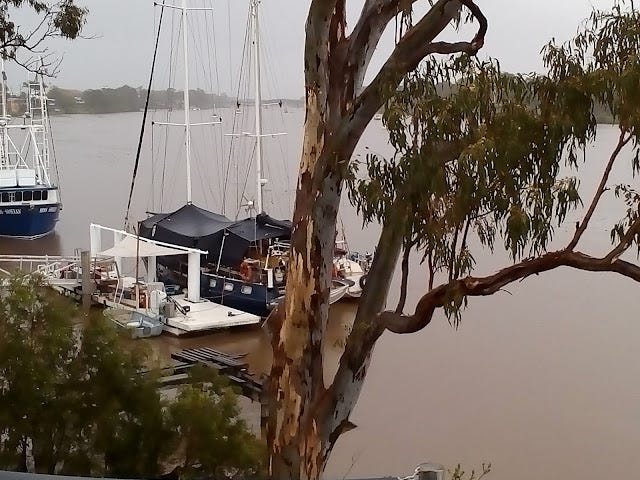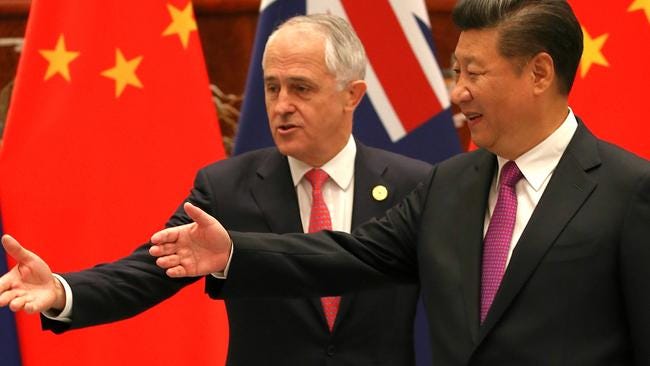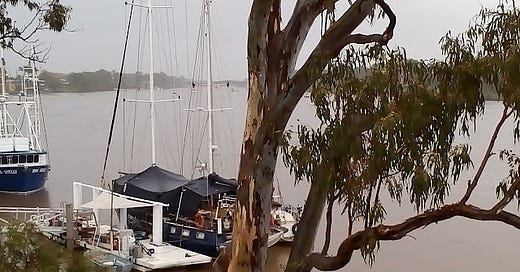
The papers played politics.
Everybody played politics.
It was a cruel and simple time.
And it was all about power.
The frantic pursuit had died down, neither as malevolent nor as urgent as it may once have been.
But the quiet was deceptive.
A desperate Prime Minister, disliked by the public and the public service, held in contempt by his colleagues, was aging before our eyes. Without credibility or integrity, with no understanding of those he "served", with elitist and totalitarian instincts on display for all to see, he was the original hollow man.
Ill-advised. In his own echo chamber. Heading a government run on announceables. Without substance or follow through.
As long as his own voice was occupying the headlines and airwaves of the day, he was happy.
He shouldn't have been.
Australia was an oligarchy, and in a way Malcolm Turnbull was the first of the worst of the oligarchs to reign over a country sold down the river by those gifted to protect it.
The tilers left the Table of Knowledge and suddenly the conversation became less ribald, more intense.
The front page headline of Rupert Murdoch's The Daily Telegraph read "from SPY CATCHER TO OPPRESSOR: A brave Malcolm Turnbull once fought the British government to publish official secrets. Now 30 years later, the Prime Minister's new laws would jail journalists and suppress the truth."
Malcolm Turnbull is on the verge of "criminalising journalism", sending reporters to jail through authoritarian secrecy laws - 30 years after winning world acclaim as a fearless, brash, young barrister fighting for the release of official secrets in the famous Spycatcher case. The Daily Telegraph can reveal the slap-dash laws are so poorly drafted Attorney-General Christian Porter will have no choice but to re-write them, but is resisting calls to make major changes. The proposed laws are so wide-ranging they drag in everyone from journalists and TV stations to charities and even the Catholic Church.And The Daily Telegraph can also reveal top intelligence chiefs were not even consulted on the espionage and foreign interference bill and are not happy either.
In an unusual piece of public candour, the Deputy Inspector of General Intelligence Jake Blight said he was not consulted about the bill . He confirmed to the paper that IGIS was not consulted, despite the organisation being responsible for oversight of the intelligence "community". A deeply riven state. A madness which had gripped them.
The proposed legislation followed on from previous rafts of legislation attacking free speech and criminalising journalism, including the creation of so-called Journalist Information Warrants, some of the worst and most totalitarian legislation ever passed in Australia.
The monsters in government now had full reign.
Journalists, editors, even their lawyers could be jailed simply for receiving so called classified documents, not even publishing them. Who decided what was secret? They did. Unaccountable. Dishonest. Distrusted. Discredited. They held the reigns of power and would threaten to sue and imprison anyone who threatened them.
The public who paid their salaries through their taxes were a long forgotten artifact.
Concerns about the legislation have been raised by security experts, media organisations and academics, with alarm that any journalist handling classified information may fall foul of the law and face up to 15 years in jail.Media, Entertainment and Arts Alliance boss Paul Murphy told the inquiry it "criminalises journalism" and elements of the bill criminalised "whistleblowers (who) bring material to journalists for public interest reporting."
Murdoch was a powerful ally. And had been blatant in his support of Australia's misnamed Liberal Party, the terrible truth out there for all to see.
He was also a powerful enemy.
But now his own commercial interests, particularly Foxtel, were being threatened by this government's insane urge to criminalise journalists and control the flow of information. To repress the public. The right to know. Freedom in all its forms.
Foxtel has also warned that the laws threatened broadcasting of the of its BBC, Al Jazeera, or other state news channels which could be considered "soft diplomacy tools". "We would have to monitor those channels 24 hours a day with subject matter experts who were capable of recognising when such an ancident arose in order to be able to monitor it," Foxtel corporate affairs director Bruce Meagher told the inquiry. Sharri Markson and Kylar Loussikian, The Daily Telegraph, 6 February, 2018.
Australia had become a step by step model example of how a country moves from a democracy to a totalitarian state within a single generation.
The country was so poorly governed, that the apparatus itself, the state, had become desperately fearful of its own exposure.
For no one must know how truly incompetent they were, the level of malfeasance that streaked through the entire apparatus, the level of oppression required to keep the facade in place.
The farce got worse every year. As did the repression.
No one must know the truth.
That the apple was rotten to the core.
That creaking, protected bureaucracies served only themselves. Not the people.
That security wise, the infiltration was complete.
That the enemy truly was inside the gates.
THE BIGGER STORY:

Key members of Federal Parliament’s national security committee are backing a move to use the committee’s powers to publish an explosive book on Chinese Communist Party influence in Australia.
Committee chair and Liberal MP Andrew Hastie and deputy chair Anthony Byrne, a Labor MP, are among those supporting the move despite the potential for diplomatic fall-out, according to multiple sources.
Two major publishers ditched the manuscript, by a professor of public ethics at Charles Sturt University, Professor Clive Hamilton, citing fears Beijing or its proxies would launch legal action.
The publishing of the manuscript by the Joint Parliamentary Committee on Intelligence and Security would further jolt relations between Canberra and Beijing, as the book exhaustively details clandestine efforts by the Chinese government to co-opt and influence Australian politicians, universities, think tanks and the media.
But by receiving the manuscript of Silent Invasion: How China Is Turning Australia into a Puppet State as an exhibit, the committee has retained a power to publish it.
Earlier this year, Melbourne University Press become the second leading publisher after Allen and Unwin to ditch plans to publish the book over concerns the Chinese government or its proxies would launch legal action.
Allen and Unwin’s decision to ditch the book in November due to "potential threats to the book and the company from possible action by Beijing" caused international headlines.
But last week, while Mr Hastie questioned Dr Hamilton in the committee about publishers ditching his book, the Liberal MP said: “What's really at stake here is not just sovereignty, national security and our long-term economic prosperity but our democratic tradition, including free speech, free press and free thought.”
Mr Byrne asked Dr Hamilton: “You have the manuscript of a book but you are saying to this committee 'you can't publish this book because of the influence of a foreign power'?”



